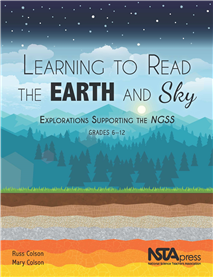All Book Chapters
Book Chapter
This chapter addresses experimental and field observations, which include aspects of Asking Questions and Defining Problems; Planning and Carrying Out Investigations; Constructing Explanations and Designing Solutions; and Engaging in Argument From Ev...
Book Chapter
Analyzing and Interpreting Data, Part 1: Graphing
This chapter addresses the interpretation of data through graphs, maps, and cross-sections, which includes aspects of Developing and Using Models; Analyzing and Interpreting Data; Using Mathematics and Computational Thinking; Engaging in Argument Fro...
Book Chapter
Analyzing and Interpreting Data, Part 2: Maps and Cross-Sections
This chapter addresses the interpretation of data through graphs, maps, and cross-sections, which includes aspects of Developing and Using Models; Analyzing and Interpreting Data; Using Mathematics and Computational Thinking; Engaging in Argument Fro...
Book Chapter
Modeling, Part 1: Conceptual Modeling
This chapter addresses the creation and use of conceptual and mathematical models, which include aspects of Developing and Using Models, Using Mathematics and Computational Thinking, and Constructing Explanations and Designing Solutions. A model is a...
Book Chapter
Modeling, Part 2: Mathematical Modeling
This chapter addresses the creation and use of conceptual and mathematical models, which include aspects of Developing and Using Models, Using Mathematics and Computational Thinking, and Constructing Explanations and Designing Solutions. In this chap...
Book Chapter
Arguing from Evidence, Part 1: Focus on Evidence
This chapter addresses identification of evidence and arguing from evidence, which include aspects of Developing and Using Models; Analyzing and Interpreting Data; Constructing Explanations and Designing Solutions; Engaging in Argument From Evidence...
Book Chapter
Arguing from Evidence, Part 2: Claim and Argument
This chapter addresses identification of evidence and arguing from evidence, which include aspects of Developing and Using Models; Analyzing and Interpreting Data; Constructing Explanations and Designing Solutions; Engaging in Argument From Evidence...
Book Chapter
This chapter focuses on reading the earth in the rocks. Rocks tell the story of Earth’s past, and we believe that lessons on rocks should include a focus on reading those stories. Many students encounter rocks as an exercise in classification and ...
Book Chapter
This chapter focuses on reading the earth in the layers of rock. Whereas rocks tell the story of what a place was like at one time in the past, layers of rock tell the story of how that place changed through time. The discovery of deep time began, no...
Book Chapter
Stories of Places We Can’t See But Can Hear
This chapter focuses on reading the earth with seismic waves and identifies several important aspects of authentic science, including asking questions, figuring out problems that you don’t already know the answer to, and putting your results into t...
Book Chapter
Stories of Places We Can’t Go But Can See
This chapter focuses on reading the earth with light. Distance learning has a long history. In this chapter, the “Suggestions for Designing an Activity” section offers a way to start with observations in building a model for phases of the Moon. T...
Book Chapter
This chapter focuses on reading the earth in the atoms. Activities are considered that can engage students at the “classroom-friendly” end of the learning spectrum. Understanding geochemical cycling and the differentiation of matter in planetary ...
Book Chapter
Teacher as Curriculum Narrator
This chapter examines the importance of the teacher in narrating the link between spontaneous and creative explorations of the classroom and the core ideas of the discipline. Implementing an authentic science experience in the classroom requires a si...
Book Chapter
This chapter examines the importance of the teacher initiating creative explorations from where you are in place and understanding. With an emphasis on the practice of doing science, students can learn to make sense of observations. They can learn h...
Book Chapter
Teacher as Mentor, Practitioner, and Scholar
This chapter examines mentoring student explorations as a fellow scholar and practitioner of science. The mentor does not give students assignments and then step back and let students sink or swim. The mentor guides, advises, nudges, and, most import...


